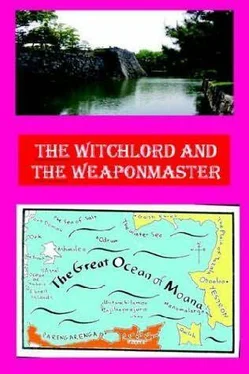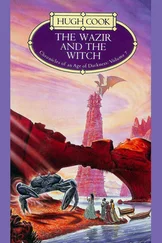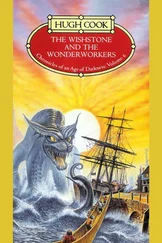Hugh Cook - The Witchlord and the Weaponmaster
Здесь есть возможность читать онлайн «Hugh Cook - The Witchlord and the Weaponmaster» весь текст электронной книги совершенно бесплатно (целиком полную версию без сокращений). В некоторых случаях можно слушать аудио, скачать через торрент в формате fb2 и присутствует краткое содержание. Жанр: Фэнтези, на английском языке. Описание произведения, (предисловие) а так же отзывы посетителей доступны на портале библиотеки ЛибКат.
- Название:The Witchlord and the Weaponmaster
- Автор:
- Жанр:
- Год:неизвестен
- ISBN:нет данных
- Рейтинг книги:5 / 5. Голосов: 1
-
Избранное:Добавить в избранное
- Отзывы:
-
Ваша оценка:
- 100
- 1
- 2
- 3
- 4
- 5
The Witchlord and the Weaponmaster: краткое содержание, описание и аннотация
Предлагаем к чтению аннотацию, описание, краткое содержание или предисловие (зависит от того, что написал сам автор книги «The Witchlord and the Weaponmaster»). Если вы не нашли необходимую информацию о книге — напишите в комментариях, мы постараемся отыскать её.
The Witchlord and the Weaponmaster — читать онлайн бесплатно полную книгу (весь текст) целиком
Ниже представлен текст книги, разбитый по страницам. Система сохранения места последней прочитанной страницы, позволяет с удобством читать онлайн бесплатно книгу «The Witchlord and the Weaponmaster», без необходимости каждый раз заново искать на чём Вы остановились. Поставьте закладку, и сможете в любой момент перейти на страницу, на которой закончили чтение.
Интервал:
Закладка:
Here note that this "voting" was a commonplace way for the
Rovac to resolve their indecisions, for, lacking reductive wisdom, these low-brained warriors were often unable to resolve their problems by intellectual analysis. When stuck in such a predicament, they therefore endeavored to fight their way out of it by the process of piling up a great weight of numbers for one side or the other through the abovementioned process known as "voting". Thus did the Rovac often decide their disputes in the way in which battles are so often decided: through sheer weight of numbers.
In this connection, it is worth noting that a similar process of "voting" was commonly used in an even more systematized form by the Orfus pirates of the Greater Teeth; from which it can be proved that your Rovac mercenary is nothing but a pirate in embryo. However, Sken-Pitilkin shared neither the Rovac love for "voting" nor the Rovac joy in battle, and said as much.
"I think," said Sken-Pitilkin, once he had voiced his objections to waging war on any pursuers from Alozay, "that we had better do better than that."
"Why?" said Guest, who was inclined to side with Thodric Jarl. "What's wrong with fighting? If we can sort this thing out by killing someone, then let's do it."
"Unfortunately," said Sken-Pitilkin, who knew the Rovac manner well, "Thodric Jarl isn't talking about sorting things out. He's talking about fighting to the death then dying."
"Oh," said Guest, his enthusiasm suddenly quenched. "What do we do then?"
There was a silence as everyone pondered this question. Then the necromancer Zozimus spoke.
"Well," said Zozimus, "I think the time for desperate measures has more or less arrived. I've done my share, you can't deny me that, so now it's your turn."
"My turn?" said Guest in bewilderment.
"He wasn't talking to you," said Sken-Pitilkin. "He was talking to me!"
And of course this was true. Zozimus, having commanded a corpse into battle at the docks of Alozay, thought he had well and properly done his share. Now it was time for Sken-Pitilkin to try something.
As the two wizards were cousins, and knew each other well, and kept a close eye on each other's affairs, Pelagius Zozimus had taken cognizance of the experiments which Sken-Pitilkin had been making, the experiments which had seen Alozay beset by explosions and by tornadoes. Now Zozimus clearly thought it time for Sken-Pitilkin to move from experiment to mature creation, despite the unavoidable perils which were implicit in such a move.
"What are you two hatching up?" said Thodric Jarl suspiciously.
"An airship," said Zozimus crisply. "A ship with which to conquer the air. My good cousin Sken-Pitilkin had done all the experimental work and is ready to proceed with a full-scale model."
"Cousin," said Sken-Pitilkin, who had the gravest of reservations about making the leap which Zozimus proposed, "this is no time for joking."
"I'm serious," said Zozimus.
Then Hostaja Sken-Pitilkin lapsed into the High Speech of wizards, and in that tongue he berated Zozimus, telling him that any attempt to fly a full-sized ship through the air would result in their certain deaths.
"Because," said Sken-Pitilkin, still speaking in the High Speech of wizards, "I have been unable to control the sustained destruction which is necessary for such flight. Any ship which I make will explode, or burn, or shake itself to death, or rupture in outright whirlwind. I cannot control the destruction!"
"Ah," said Zozimus, "but I can guess why, already. You have not provided your sustained destruction with a safety valve."
"A safety valve?" said Sken-Pitilkin. "What are you talking about?"
"A safety valve," said Zozimus, "is a valve built into a pressure cooker. Now pressure cookers – "
"Oh, pressure cookers!" said Sken-Pitilkin. "Now I remember!"Sken-Pitilkin remembered very well, even though his cousin's experiments with pressure cookers had taken place a good three generations earlier. In the course of his experimenting, Zozimus had blown up three kitchens, and had almost blown up himself. On one notable occasion -
But enough of this! Life is far too short for us to be giving a full account of the derelictions of Pelagius Zozimus, that over- rated and over-paid slug-chef who ever won greater resources for his kitchens than all the irregular verbs in the world could command in nine times ninety generations. Sufficient to say that Zozimus's experiments with pressure cookers had been exhaustive, not to say exhausting, and Sken-Pitilkin remembered as much, and the truth of the memory was clearly written on Sken-Pitilkin's face.
"Yes," said Zozimus, reading his cousin's expression. "You remember well. Well, then. I ventured. I experimented. And I learnt! What I learnt through the design of pressure cookers is that great forces must be given a means of escape. If the force grows too great, then it must blow its way clear through a weak point in the device, thus preserving the integrity of the device."
Then Zozimus explained that, in his judgment, the flame trench known as Drangsturm was a perfect example of the control of great destructive forces. If the destruction temporarily got out of hand, then great gouts of flame would be thrown high in the air, thus bleeding off the surplus force with no harm to the fabric of the device which generated that force.
"I see," said Sken-Pitilkin. "So you think I should govern the forces unleashed in my airship by – by what? By arranging for bits of the ship to be selectively smashed to smithereens by an excess of such force?"
"No," said Zozimus. "I believe you should arrange for excess force to be bled off in the form of rotational energy." Sken-Pitilkin thought about this, trying to work through the logical implications of Zozimus's suggestion.
"But," said Sken-Pitilkin, once he understood the import of his cousin's proposal, "that would mean my ship would spin round and round like a – a – like something that spins round and round, what do you call those things, a – "
"A windmill," said Zozimus.
"Yes, a windmill, or one of those, those, you know, those octopus things, those things that whirl round and round on a stick, round and round – "
"A species of firework," said Zozimus.
"Yes, yes," said Sken-Pitilkin, "fireworks, that time in Tang, you remember, round and round, round and round, sparks and smoke in all directions, and then, then – bang!"
"There would be no bang," said Zozimus positively. "There would merely be a trifle amount of… rotation."
"Whirlygigging," said Sken-Pitilkin, direly suspecting that "rotation" was at best but a weak euphemism for the consequences of the arrangement which Zozimus was proposing. "Whirlygigging, round and round like an octopus. The ship would burst. Or at the least – I'm sure at the very least we'd all be hideously sick. I won't have anything to do with the idea."
Yet in time – and a remarkably short time it was – Sken-Pitilkin was persuaded. The precise time of his persuasion was noon, for by noon the master chef Zozimus had prepared a delicious meal, working with slugs and watercress, with sheep bones and freshwater crabs, with puffballs and mushrooms, with chopped worms and tadpoles, all brisked and enlivened with touches of this and that from his secret emergency herb hoard and spice stock. And with this meal complete, Zozimus gave Sken-Pitilkin an ultimatum:
"Design an airship or starve."
Thus a decision was reached in favor of flight, and after lunch the brave Sken-Pitilkin went to work, converting the ruinous hulk of a watership into an airship. He exercised his power in the manner of wizards, converting certain timbers of this ship into artefacts possessed of magical power – artefacts which the universe itself would seek to destroy if it got but half a chance. Sken-Pitilkin wrought these devices in such a way that their magical nature could be shielded or unshielded at his command.
Читать дальшеИнтервал:
Закладка:
Похожие книги на «The Witchlord and the Weaponmaster»
Представляем Вашему вниманию похожие книги на «The Witchlord and the Weaponmaster» списком для выбора. Мы отобрали схожую по названию и смыслу литературу в надежде предоставить читателям больше вариантов отыскать новые, интересные, ещё непрочитанные произведения.
Обсуждение, отзывы о книге «The Witchlord and the Weaponmaster» и просто собственные мнения читателей. Оставьте ваши комментарии, напишите, что Вы думаете о произведении, его смысле или главных героях. Укажите что конкретно понравилось, а что нет, и почему Вы так считаете.












